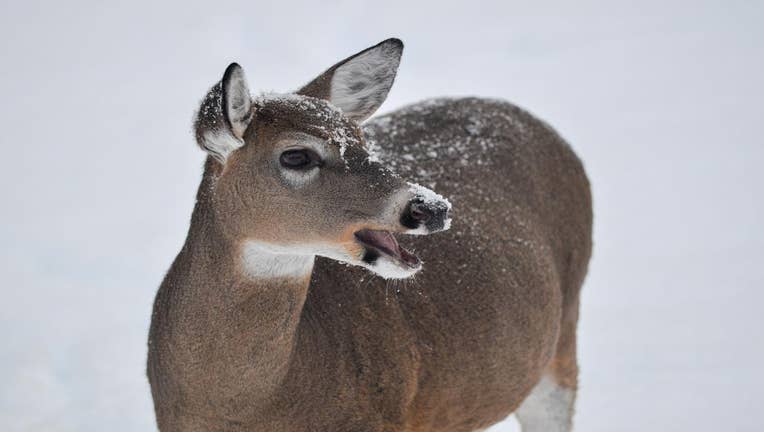Hunting in Michigan: How to get your deer tested for chronic wasting disease

A white-tailed deer on a snowy November day in Marquette County. (Photo: DNR)
(FOX 2) - Michigan deer hunters headed out this year have several options for testing their harvests for chronic wasting disease (CWD).
Voluntary testing is used to monitor and limit the spread of CWD, a neurological disease that can cause behavioral changes, such as a loss of fear of humans and loss of awareness.
In 2021, the Michigan Department of Natural Resources started rotational testing, where testing is focused on a set of counties each year. Since starting this, the state has detected 13 cases of CWD in 13 of Michigan's 83 counties. The disease was most recently detected in a deer in Ogemaw County last fall.
According to the state, the DNR has collected enough baseline information in 61 of the state's 83 counties and is conducting surveillance in the remaining 22 counties to meet the baseline information needs in these areas.
How and where to test for CWD
This year, the state is focusing its testing in these counties: Antrim, Arenac, Baraga, Benzie, Cheboygan, Chippewa, Clare, Dickinson, Gladwin, Grand Traverse, Houghton, Iosco, Kalkaska, Keweenaw, Leelanau, Luce, Mackinac, Manistee, Ogemaw, Ontonagon, Otsego, and Schoolcraft.
Hunters can have their deer tested for free at DNR submission locations found here. Self-sample kits are also available at certain submission sites. Find the list of locations here.
Hunters also have options for paid testing for deer harvested from counties not eligible for free testing. Learn more here.
How to report deer that may be sick
Hunters who observe unusual deer behavior can report it to the DNR.
Deer carcass transportation
Deer harvested outside of Michigan and deer harvested in Montcalm County in its entirety; Otisco, Orleans, Ronald or North Plains townships in Ionia County; or Nelson, Spencer, Courtland, Oakfield, Grattan or Cannon townships in Kent County cannot be possessed or transported outside of those listed areas, unless:
- The harvested deer is deboned meat, quarters or other parts of a cervid that do not have any part of the spinal column or head attached, antlers, antlers attached to a skull or skull cap cleaned of all brain and muscle tissue, hides, upper canine teeth, or a finished taxidermist mount OR
- The deer carcass is taken directly to a registered processor; AND/OR
- The intact deer head detached from the carcass is taken directly to a licensed taxidermist.
Deer carcass disposal
Dispose carcasses in designated landfills or bury the carcass several feet underground.

